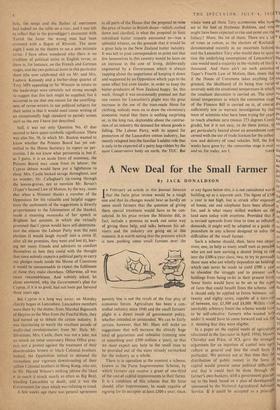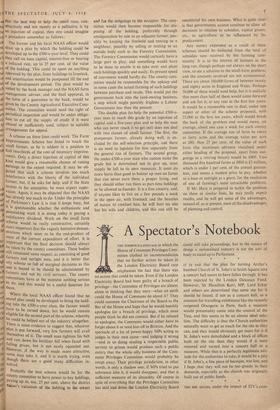A New Deal for the Small Farmer
By JACK DONALDSON IN February an article in this journal forecast that the farm price review would be a tough one and that its changes would bear so hardly on some small farmers that the question of giving them special treatment would have to be con- sidered. In his price review the Minister did, in fact, include a promise to work out some way of giving them help, and talks between his ad- visers and the industry are going on at this moment. It is worth noting that the pressure which is now pushing some small farmers over the poverty line is not the result of the free play of economic forces. Agriculture has been a con- trolled industry since 1940 and the small farmers' plight is a direct result of government policy, whether intended.or unintended. We can be fairly certain, however, that Mr. Hare will make no suggestions that will increase the already huge total of guarantees and subsidies (running now at something over £300 million a year), so that we must expect any help to the small man to be -provided out of the sums already earmarked for the industry as a whole.
There is in operation at the moment a scheme, known as the Farm Improvements Scheme, by which farmers can receive a grant of one-third of the cost of capital improvements to their farms. It is a condition of this scheme that the farm should, after improvement, be made capable of evning for its occupier at least £500 a year, since, so in ha eh hr `1.1 p1 th fa at any figure below this, it is not considered worth building up as a separate unit. The figure of £500 ha a year is not high, but is struck after expenses „r of house, car and telephone have been allowed for, and is what many skilled workers on the p„ land earn today with overtime. Provided that 0 sa is revised upwards from time to time as inflation sc demands, it might well be adopted as a guide to ni procedure in any scheme designed to solve the 811 difficulties of the small farmer.
Such a scheme should, then, have two objeo' fives; one, to help as many small men as possible be who are not now earning a decent living to rise into the £500-a-year class; two, to try to persuade those men who are wholly dependent on holdings an which can never be made to yield £500 a year or to abandon the struggle and to prevent such fa holdings from being re-let in their present form, co Some limits would have to be set to the types to of farm that could benefit from the scheme, and th it should only be applied to farms between. saY, twenty and eighty acres, capable of a turn.iver of between, say, £1,500 and £4,000. Within nese inevitably arbitrary limits the scheme would have to be self-selective; farmers who wanted hell' under it would have to come forward and ask for it, showing that they were eligible.
In a paper on the capital needs of agriculture (discussed in the Spectator in April, 1956), Messrs, Cheveley and Price, of ICI, gave the strongest arguments for an injection of capital into nil, culture in general and into the small farm In particular. We pointed out at that time that the distribution of public money in the form of capital would present some political difficulties and that it could best be done through the farmer's own bankers, with a government &min' tee to the bank based on a plan of development sponsored by the National Agricultural Advisory' Service. If it could be accepted as a principle that the best way to help the small man, con- structively and not merely as a palliative, is by an injection of capital, then one could imagine a procedure somewhat as follows : The farmer and his local NAAS officer would draw up a plan by which the holding could be developed up to the £500-a-year level. They could then call on loan capital, interest-free or bearing a reduced rate, up to 25 per cent. of the value of the holding. This could be spent on anything approved by the plan, from buildings to livestock, and amortisation would be postponed till the end of the development period. The plan would be vetted by the bank manager and the NAAS farm management adviser, and the final approval, in the form of a guarantee to the bank, would be given by the County Agricultural Executive Com- mittee. The committee would need the right of Periodical inspection and would be under obliga- tion to cut off the supply of credit if it were abused or inefficiently used, subject to suitable arrangements for appeal.
A scheme on these lines could work. The Farm Improvements Scheme has failed to touch the small farmer, as he is seldom in a position to find two-thirds of the cost of necessary improve- ments. Only a direct injection of capital of this kind would give a reasonable chance of raising earnings to the extent required. It may be ob- jected that such a scheme inVolveS too much interference with the liberty of the individual farmer, but, if he asks for help, and if the State invests in his enterprise, he must expect super- vision. Again, it may be objected that the NAAS has already too much to do. Under the principles of Parkinson's Law it is true it keeps busy, but It is questionable whether the enthusiastic and Painstaking work it is doing today is paying a satisfactory dividend. Work on the small farm scheme would be really constructive, certainly more important that the vaguely hortative demon- strations which seem to be the end-product of most of the current expenditure of effort. It is important that the final decision should always be taken by the county committees. These bodies still command some respect, as consisting of good farmers and upright men, and it is better that any schenie so full of marginal decisions as this one is bound to be should be administered by farmers and not by civil servants. The county committees have at the moment nothing serious to do, and this would be a useful function for them.
Where the local NAAS officer found that no sound plan could be developed to bring the hold- ing into the £500-a-year class, the farmer would have to be turned down, but he would remain eligible for the second part of the scheme, whereby he could be helped out of the industry altogether. There is some evidence to suggest that, whatever Plan is put forward, very few farmers will avail themselves of it. The small man tightens his belt and cuts down his fertiliser bill when faced with falling prices, but is not easily squeezed out. However, if the way is made more attractive, some may take it, and it is worth trying, even though there are a good many difficulties in- volved.
Probably the best scheme would be for the county committee to have power to buy holdings, Paying up to, say, 25 per cent, above the district valuer's valuation of the holding to the owner ye ho he I ot Ic in S.
C'S
-ty
iat or ics ch 10- ,ge Sc.
irs to lye et
rtb ;00 se
he oil to .he
oc- ble ise ,cie igs !.:11 ich
lid ty, /cr !se ye or
and for the outgoings to the occupier. The com- mittee would then become responsible for dis- posing of the holding, preferably through amalgamation by sale to an adjacent farmer, pos- sibly by keeping the freehold and renting to a neighbour, possibly by selling or renting to an outside body such as the Forestry Commission. The Forestry Commission would certainly have a large part to play, and something would have to be done to enable it to take over and plant such holdings quickly and easily. Its present speed of movement would hardly do. The county com- mittee would be responsible for the upkeep and in some cases the actual farming of such holdings between purchase and resale. This would put the government back into the land-owning business, a step which might possibly frighten a Labour Government less than the present.
This double plan (to help the potential £500-a- year man to reach this grade by an injection of capital and a five-year plan and to help the man who can never reach it to get out) does not deal with two classes of small farmer. The first, the prosperous farmer, already doing well, is ex- cluded by the self-selection principle, and there is no need to legislate for him separately from the general run of farmers. The second group, the under-£500-a-year man who cannot make the grade but is determined not to give up, must simply be left •to its own resources. It must do more harm.than good to bolster up men on farms that can never earn them a proper living, and they should either run them as part-time holdings or be allowed to founder. It is a free country, and; if anyone likes to live On a few pounds a week in the open air, with livestock and the beauties of nature to comfort him, he will hurt no one but his wife and children, and this can still be considered his own business. What is quite clear is that governments cannot continue to allow all decisions in relation to subsidies, capital grants, etc., to agriculture to be influenced by his predicament.
Any money expended as a result of these schemes should be deducted from the total of subsidies now received by the farming com- munity. It is to the interest of farmers in the long run, though perhaps not always on the short view, to see a solution to the small-farm problem, and the amounts involved are not astronomical. There are about 100,000 farms of between twenty and eighty acres in England and Wales. Perhaps 50,000 of these would need help, but it is unlikely that more than half of them would come forward and ask for it, at any rate in the first few years. It would be a reasonable aim to deal, under one aspect or other of the scheme proposed, with 25,000 in the first ten years, which would break the back of the problem and would mean, on average, about one case a week for each county committee, If the average size of farm be taken as forty acres and the average value per acre as £80, then 25 per cent, of the value of each farm (the maximum advance visualised under either heading of the proposal, apart from out- goings to a.retiring tenant) would be £800. Two thousand five, hundred farms at £800 is £2 million, which is under 1 per cent. of the annual guaran- tees, and seems a modest price to pay, whether as a loan or outright as a grant, for the resolution of one of farming's most intractable problems.
If Mr. Hare is prepared to tackle the problem on-these or similar lines, he may really expect results, and he will get some of the advantages, instead of, as at present, most of the disadvantages, of planning and control.























































 Previous page
Previous page